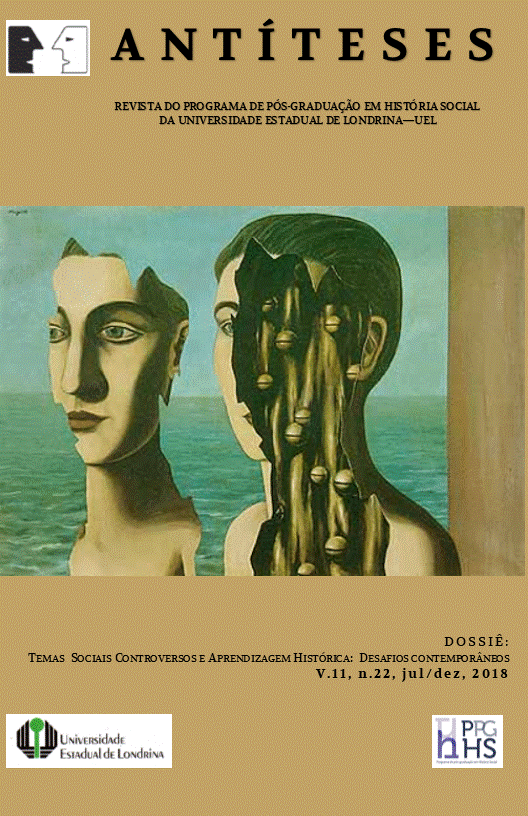Rudolf Brazda and Paragraph 175: the fight of a homosexual prisoner in concentration camps
DOI:
https://doi.org/10.5433/1984-3356.2018v11n22p709Keywords:
Homosexuality, Homophobia, Second war, Nazism, Concentration campAbstract
This article present the experiences of Prisoner of War Rudolf Brazda, who was sent to the Buchenwald concentration camp in Nazi Germany as a homosexual. The early twentieth century, embraced by the conception of eugenics movements - influenced by social Darwinism and considered as science - allowed for segregation, racist, homophobic events and gave broad power to the development of prejudiced policies, making condemnations arbitrary. In this context, Brazda had his civil liberty violated by Hitler's totalitarian regime, relying on Paragraph 175 of the German Criminal Code, which condemned male homosexuality and bestiality in the spectrum of lusty convictions, liable to condemnation and retreat of citizenship, even to remain detained for 32 months in an environment of exposure of the totalitarian ideals propagated by the German government. Finally, addressing the biography of Brazda, it is intended to expose possible advances in international policy for the defense of human rights, with the emergence of the Universal Declaration of Human Rights proposed by the UN, which aims to maintain peace and adjust essential guarantees and duties for the preservation of individuals and diplomatic recognition of their dignity.Downloads
Download data is not yet available.
References
ANSART, Pierre. La gestion des passions politiques. Lausanne: L’Age d’Homme, 1983.
AVELAR, Alexandre de Sá. A biografia como escrita da História: possibilidades, limites e tensões. Revista Dimensões, Vitória, v. 24, n. 1, p. 157-172, fev./mar. 2010.
BOURDIEU, Pierre Félix. A ilusão biográfica: usos e abusos da história oral. São Paulo: FGV, 1996.
CAETANO, Tiago Lemanczuk Fraga. Mein Kampf e o Ideário Nazista. Revista Eletrônica de Direito, Brasília, v. 1, n. 4, maio/ago. 2010.
COMPARATO, Fábio Konder. A afirmação histórica dos direitos humanos. São Paulo: Saraiva, 2010.
ÉSQUILO. Prometeu acorrentado. São Paulo: Clássicos Jackson, 2005.
FIGUEIRÓ, Mary Neide Damico (org.). Homossexualidade e Educação Sexual: construindo respeito à diversidade. Londrina: EDUEL, 2007.
GUERRA, Andréa. Do Holocausto nazista à nova eugenia do século XXI. Revista Tendências, Crato, v. 12, n. 1, p. 4-5, jun. 2014.
LAFER, Celso. A ONU e os direitos humanos. Estudos Avançados, São Paulo, v. 9, n. 25, p. 169-185, jan./jun. 1995.
LONGERICH, Peter. A arquitetura da solução final. Revista BBC História, São Paulo, v. 1, n. 1, p. 16-23, fev./jun. 2008.
MAGALHÃES, Marion Brepohl de. Campo de concentração: experiência limite. Revista História: Questões e Debates, Curitiba, v. 1, n. 35, p. 61-79, jan./jun. 2001.
MOLINA, Luana Pagano Peres. Professores homossexuais: suas vivências frente à Comunidade Escolar. 2010. 90 f. Monografia (Especialização em Psicologia Aplicada à Educação) – Universidade Estadual de Londrina, Londrina, 2010.
ONU - ORGANIZAÇÃO DAS NAÇÕES UNIDAS PARA A EDUCAÇÃO, A CIÊNCIA E A CULTURA. Declaração Universal dos Direitos Humanos. Brasília: ONU, 1998.
SCHWAB, Jean-Luc; BRAZDA; Rudolf. Triângulo rosa: um homossexual no campo de concentração nazista. São Paulo: Mescla, 2012.
SEEL, Pierre; LE BITOUX, Jean. Moi, Pierre Seel, déporté homosexuel. Paris: Éditions Calmann-Lévy, 1994.
SETTERINGTON, Ken. Marcados pelo triângulo rosa. São Paulo: Melhoramentos, 2013.
AVELAR, Alexandre de Sá. A biografia como escrita da História: possibilidades, limites e tensões. Revista Dimensões, Vitória, v. 24, n. 1, p. 157-172, fev./mar. 2010.
BOURDIEU, Pierre Félix. A ilusão biográfica: usos e abusos da história oral. São Paulo: FGV, 1996.
CAETANO, Tiago Lemanczuk Fraga. Mein Kampf e o Ideário Nazista. Revista Eletrônica de Direito, Brasília, v. 1, n. 4, maio/ago. 2010.
COMPARATO, Fábio Konder. A afirmação histórica dos direitos humanos. São Paulo: Saraiva, 2010.
ÉSQUILO. Prometeu acorrentado. São Paulo: Clássicos Jackson, 2005.
FIGUEIRÓ, Mary Neide Damico (org.). Homossexualidade e Educação Sexual: construindo respeito à diversidade. Londrina: EDUEL, 2007.
GUERRA, Andréa. Do Holocausto nazista à nova eugenia do século XXI. Revista Tendências, Crato, v. 12, n. 1, p. 4-5, jun. 2014.
LAFER, Celso. A ONU e os direitos humanos. Estudos Avançados, São Paulo, v. 9, n. 25, p. 169-185, jan./jun. 1995.
LONGERICH, Peter. A arquitetura da solução final. Revista BBC História, São Paulo, v. 1, n. 1, p. 16-23, fev./jun. 2008.
MAGALHÃES, Marion Brepohl de. Campo de concentração: experiência limite. Revista História: Questões e Debates, Curitiba, v. 1, n. 35, p. 61-79, jan./jun. 2001.
MOLINA, Luana Pagano Peres. Professores homossexuais: suas vivências frente à Comunidade Escolar. 2010. 90 f. Monografia (Especialização em Psicologia Aplicada à Educação) – Universidade Estadual de Londrina, Londrina, 2010.
ONU - ORGANIZAÇÃO DAS NAÇÕES UNIDAS PARA A EDUCAÇÃO, A CIÊNCIA E A CULTURA. Declaração Universal dos Direitos Humanos. Brasília: ONU, 1998.
SCHWAB, Jean-Luc; BRAZDA; Rudolf. Triângulo rosa: um homossexual no campo de concentração nazista. São Paulo: Mescla, 2012.
SEEL, Pierre; LE BITOUX, Jean. Moi, Pierre Seel, déporté homosexuel. Paris: Éditions Calmann-Lévy, 1994.
SETTERINGTON, Ken. Marcados pelo triângulo rosa. São Paulo: Melhoramentos, 2013.
Downloads
Published
2019-01-30
How to Cite
MOLINA, Luana Pagano Peres; ANDRADE, Lucas de Melo; SILVA, Pedro Arthur Passos da. Rudolf Brazda and Paragraph 175: the fight of a homosexual prisoner in concentration camps. Antíteses, [S. l.], v. 11, n. 22, p. 709–726, 2019. DOI: 10.5433/1984-3356.2018v11n22p709. Disponível em: https://ojs.uel.br/revistas/uel/index.php/antiteses/article/view/33443. Acesso em: 16 feb. 2025.
Issue
Section
Articles










